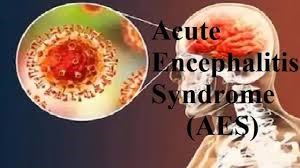Acute Encephalitis Syndrome i.e. AES is a nerve disorder that exacerbates the vessels in the brain and limbic system, caused by several kinds of bacteria, viruses, microbes, yeast, organisms, toxins, and many more. Acute Encephalitis Syndrome is considered a compound disease as it attacks the brain as well as the immune system. As soon as the virus enters inside the blood, it starts moving to the brain tissues and proliferates itself. When this autogenous retort and the contagion synthesizes, this leads to inflammation or swelling on the brain and it considerably attacks the spinal code and our vital nervous system triggering impairment to the brain cells through microbe infected blood vessels.
Acute Encephalitis Syndrome or Japanese Encephalitis or Chamki fever or Brain fever or Litchi virus is soreness or pain in the brain. It is also considered as severe onset of fever along with deteriorated mental status such as disorientation, confusion, coma. It can result in significant indisposition and death, usually affects youngsters and teenagers. Acute Encephalitis Syndrome generally affects children under 15 years of age. The reason for death in children is low blood sugar level i.e. Hypoglycaemia.
What are the symptoms of Acute Encephalitis Syndrome?
- Headache
- A severe onset of fever or high fever
- Disorientation
- Nausea
- Coma or paralysis
- Mental confusion
- Seizures
- Loss of memory
- Sensitivity to light
- Inflexible back and neck
- Difficulties with speech or hearing
- Sleepiness
Who is more likely to get affected by Acute Encephalitis Syndrome?
- It usually affects children below 15 years
- Acute Encephalitis Syndrome spreads widely in Gangetic plains such as Assam, East UP, States of Bihar, some portion of Tamil Nadu, and West Bengal
How Acute Encephalitis Syndrome can be prevented?
- Proper sanitation measures
- Providing safe drinking water
- Appropriate measures should be taken to reduce mosquito density. Taking precautions such as using mosquito nets, wearing fully covered clothes and using repellents, etc. are essential to protect yourself from a mosquito bite.
- Taking the necessary steps to enhance the nutritional status of children who can be at risk of Acute Encephalitis Syndrome (AES)
- As per the guidelines of the Government of India, an infant should be given 2 doses of the JE/AES vaccine.
- The human dwellings and animal sheds shouldn’t be near to each other, as this increases the risk of transmission.
How Acute Encephalitis Syndrome can be cured?
- Acute Encephalitis Syndrome (AES) can be cured by giving antibiotics, antiviral medicines, support, and compassionate care. The cure for hypoglycemia comprises providing dextrose intravenously, it is similar to glucose. There are other preventive measures which a person can take, which includes:
- Make sure your child eats cooked meal especially before sleeping in the night
- A child shouldn’t be eating unripe or too many litchis, keep them, child, under parental supervision
If your child is also facing above mentioned symptoms, don’t take it lightly, consult a doctor immediately. We at the Bansal Global Hospital have a team of specialized pediatrics who focuses on complete and integrated child health care service with a caring atmosphere.
Fix Your Appointment Today and Contact Us At +91-9911062832.


 MAKE AN APPOINTMENT
MAKE AN APPOINTMENT